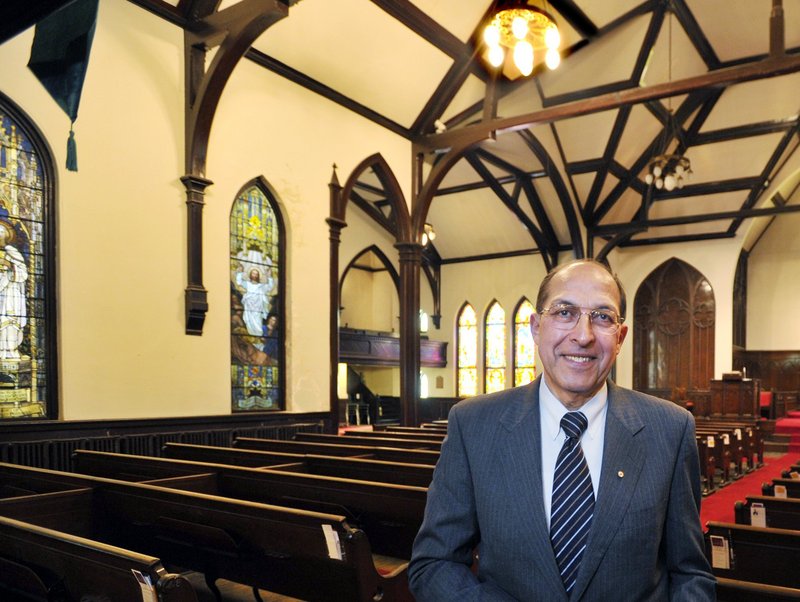PORTLAND – Western Promenade residents fighting “commercial encroachment” into Portland’s toniest neighborhood will have to discredit a city staff report that recommends the Portland Planning Board approve a controversial plan to establish offices in a landmark church’s parish house.
The plan would restore the 135-year-old sanctuary and thus achieve the city’s goal of preserving its historic resources, an objective spelled out in the city’s comprehensive plan, city planner Jean Fraser says in a report to the board.
The board’s staff is recommending that the board approve a zoning change tonight that would allow offices for up to 14 workers in the Williston-West Church parish house on Thomas Street.
The proposal by Australian businessman Frank Monsour would produce “minimal alterations to the character-defining features of these two unique buildings,” Fraser wrote in the 17-page report.
The plan requires city approval because the church — which the congregation left last year — is in a zone that only permits residential uses. To approve the zoning change, the Planning Board must conclude that the proposal is in “basic harmony” with the city’s comprehensive plan.
Opponents, primarily neighborhood residents, note that same comprehensive plan also calls for “protecting and enhancing neighborhood character.” They say that allowing office space in the church’s parish house would set a precedent and allow more businesses to move into the neighborhood. Residents for decades have worked to protect the neighborhood from commercial and institutional encroachment.
Built in 1877, the Williston-West sanctuary was designed by Francis Fassett, a prominent architect. In 1904, John Calvin Stevens, Portland’s most famous architect, built the parish house. The church is on the National Registry of Historic Places.
Monsour, who bought the church from the congregation late last year, has said he wants to preserve the church’s historic sanctuary as a “living monument” for public use, such as concerts for string quartets. The parish house would serve as his family’s residence when visiting in the U.S., and also as office space for the American headquarters of his small, startup software development company, Majella Global Technologies.
The zoning change would allow up to 14 people to work in the first floor of the parish house.
Opponents say the parish house and sanctuary should instead be converted into condominiums. Current zoning would allow up to four residential units.
But converting the sanctuary into condominiums would likely result in the removal of the church’s stained-glass windows and also alterations to the building’s exterior, said Deb Andrews, who manages the city’s historic-preservation program.
In a letter to the Planning Board, Andrews praises Monsour’s plan to replace the existing asphalt roof, which is leaking, with a slate roof expected to last 100 years. She said his rehabilitation plan for the building satisfies the city’s goal of ensuring the “soundness and integrity of the building envelope and structural elements.”
Monsour, who has said he plans to spend as much as $1 million to restore the building, said condominiums would never pay for the improvements. The pea-green slate roof alone will cost $275,000, he said.
Anne Pringle, president of the Western Promenade Neighborhood Association, said she’s disappointed that Monsour’s assertion was never validated by city staff. She said similar structures have been converted to residential use.
It’s possible to both restore the building and allow for residential uses, said Orlando Delogu, a former Planning Board chairman and retired law professor who lives in the neighborhood.
Before Monsour asks for a zoning change, Delogu said, he is obligated to consider how to renovate the building under existing rules.
“The burden is on him, not the neighbors,” Delogu said. “He has not introduced a shred of evidence that permitted residential use would not provide a similar or more valuable economic platform.”
Monsour, who is in Australia, could not be reached for comment. Jed Rathband, his spokesman, said Monsour is optimistic that the Planning Board tonight will give a “strong recommendation” for the zoning change.
Rathband said he expects the City Council will take up the issue in July. He said some residents who initially opposed the plan now recognize it’s the best way to both preserve the church and minimize the impact on the neighborhood.
“They have begun to see that this is truly the best option one could really hope for,” he said.
Staff Writer Tom Bell can be contacted at 791-6369 or at: tbell@presshearld.com
Send questions/comments to the editors.



Success. Please wait for the page to reload. If the page does not reload within 5 seconds, please refresh the page.
Enter your email and password to access comments.
Hi, to comment on stories you must . This profile is in addition to your subscription and website login.
Already have a commenting profile? .
Invalid username/password.
Please check your email to confirm and complete your registration.
Only subscribers are eligible to post comments. Please subscribe or login first for digital access. Here’s why.
Use the form below to reset your password. When you've submitted your account email, we will send an email with a reset code.